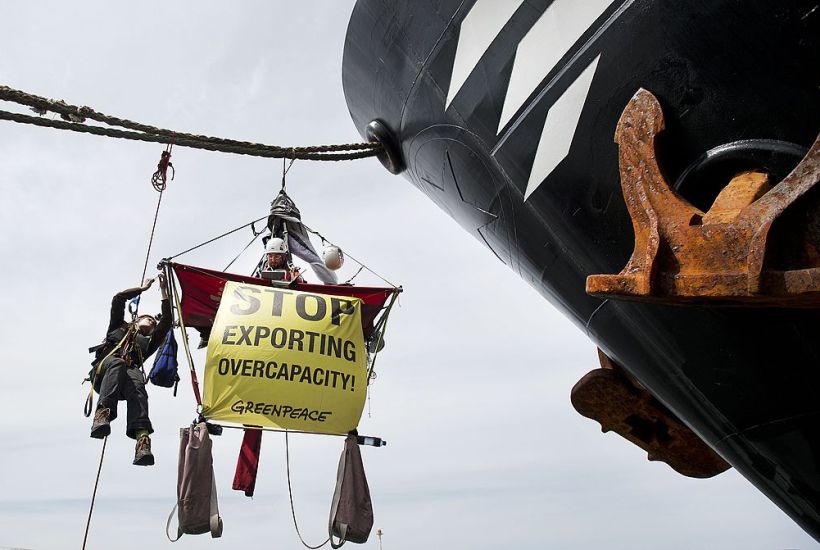Earlier this year, fifteen Greenpeace activists illegally accessed a ten-storey high coal stockpile at the Port of Newcastle. They put themselves and police rescuers in danger to push their anti-mining messages. The protesters were arrested.
You helped pay for it.
In the same month, Greenpeace activists scaled Commonwealth Bank’s headquarters in Sydney to protest against something the bank was apparently doing that Greenpeace didn’t like. Police were called and the protesters were arrested.
You helped pay for it.
These are just two examples of what has become a regular occurrence. Groups like Greenpeace, Lock the Gate, 350.org and others are increasingly and deliberately using what they describe as ‘direct action’ tactics to promote their campaigns and causes. Calling it ‘direct action’ is their way of justifying breaking the law to push their agenda.
What’s most concerning about these unlawful forms of protest is that the activists usually put themselves and others in harm’s way. People trying to get on with their daily lives are also often caught up in the protest. Emergency services personnel are often forced away from more important duties to remove protesters who have trespassed, chained themselves up or ‘locked on’ to heavy equipment to put themselves in danger, requiring assistance to make themselves safe again.
In a free democracy like ours, everyone should have the right to protest within the law. However, if activists choose to break the law, they should face the consequences of their actions just like everyone else. Instead, some activist groups receive taxpayer assistance for doing so.
Under the current tax system, some activist groups engaging in unlawful activity receive special tax treatment to raise money for their causes.
Groups like Greenpeace, Lock the Gate, the Sunrise Project and others currently enjoy Deductible Gift Recipient or DGR status. This means every donation made to them is tax deductible. This foregone tax revenue is supposed to encourage philanthropy.
DGR status helps legitimate not-for-profit organisations attract donations. It also helps activist groups do the same. These activist groups with DGR status are better able to attract donations that can then be used to fund their ‘direct action’ campaigns. In effect, DGR status for these activist groups is a taxpayer subsidy to help pay for breaking the law.
In 2015-16, donations to just eight registered environmental organisations, including Lock the Gate and Greenpeace Australia Pacific, amounted to $72 million. Based on an average tax rate of 24 per cent the cost to taxpayers for these eight groups alone is at least $17 million every year.
This just doesn’t pass the pub test. Taxpayers have a right to expect that any special tax concessions aren’t given to help professional activist groups break the law.
It’s reasonable to expect that any environmental organisation claiming to be a ‘charity’ would focus on delivering on-ground environmental benefits, like planting trees or feral weed mitigation. Groups like Landcare do exactly this type of work and rightly receive DGR status to help raise funds.
However, if some activist groups want to take this further through ‘direct action’ involving illegal activity, they should have to pay for it themselves. Taxpayers should not be forced to subsidise crimes committed to promote activist campaigns and causes.
There’s currently an opportunity for change.
In 2016 a federal government committee recommended that administrative sanctions, including loss of tax deductibility status, be introduced for environmental deductible gift recipients that engage in, encourage, support, promote, or endorse illegal or unlawful activity.
The committee also recommended that the value of each environmental deductible gift recipient’s annual expenditure on environmental remediation work be no less than 25 per cent of the organisation’s annual expenditure from its public fund.
The government is now considering submissions on a discussion paper regarding these recommendations, to decide whether or not they should be implemented.
Some have argued that removing DGR status for groups involved in illegal activity is an attack on freedom of speech. This is complete nonsense. Removing DGR status from groups that break the law does not restrict in any way the right of any group from campaigning. It will, however, mean that those prepared to commit a crime to make their point do it at their own cost, not force taxpayers to contribute.
This is a test of the government’s mettle. Will they stand up for law abiding taxpayers and protect the integrity of the tax system for real charities? Or will they listen to the minority voices of loud professional activists who have little regard for the law or interests of our communities?
Stephen Galilee is chief executive officer of the NSW Minerals Council
Got something to add? Join the discussion and comment below.
Got something to add? Join the discussion and comment below.
Get 10 issues for just $10
Subscribe to The Spectator Australia today for the next 10 magazine issues, plus full online access, for just $10.


























Comments
Don't miss out
Join the conversation with other Spectator Australia readers. Subscribe to leave a comment.
SUBSCRIBEAlready a subscriber? Log in